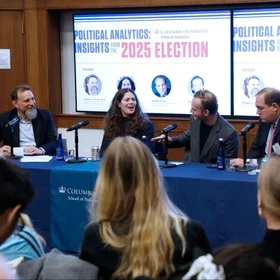Reshan Richards is the CEO and Co-Founder of Explain Everything, Inc., a software development company whose platform enables educators and companies to create enhanced learning opportunities in any modality. He is also a lecturer in the Human Capital Management program at SPS teaching the Organizational Strategy and Learning course. With a background in K-12 education and experience as a founder, Richards describes how and why he pursued a career in Human Capital Management in the following Q&A.
What drew you to a career in human capital management?
Learning is what drew me into HCM. I started as a K-12 teacher and administrator and then co-founded a software company that created a tool for teachers to use. Soon, folks in corporate learning and universities began to use this tool as well and over the years I’ve gotten to learn more about this field and help companies on a lot of really interesting organizational learning projects.
What aspect of your journey has allowed you to succeed in this industry?
In one of my first corporate learning projects, with a global telecommunications company, I very quickly learned that the challenges that professional trainers and content developers were facing were very similar to those faced both by K12 teachers and college/university educators. In working with that client, it also became very important to ‘teach’ them and have them experience things in the same way that they’d ultimately want to serve their constituents. This is very different from a ‘just tell us what to do’ approach. When people make meaning during a learning experience, instead of just learning about something, it has a longer lasting effect and will influence the design of future learning interventions.
In several key areas, it is important for students entering this field to be aware of multiple points on a continuum and to be able to discern what approach/model might be best for a given situation in both the near term and long term.
What industry trends should students entering this field be aware of?
In several key areas, it is important for students entering this field to be aware of multiple points on a continuum and to be able to discern what approach/model might be best for a given situation in both the near term and long term. This may be a long way of suggesting to be strategic, but here are a couple of examples.
First, some companies have centralized learning functions across their organization, while others have learning more closely tied to individual business units. And then some have a combination of both. What’s important for students to understand is what has worked well across that continuum (and what hasn’t worked well) and to understand the factors at play.
Another trend might be the desire/demand of the workforce to be remote. The continuum might include fully remote, hybrid, or entirely in person. And students (and organizations) need to understand the affordances and limitations of all models across a variety of scenarios. For example, fully remote onboarding of new employees may not be great for creating a sense of belonging - investing in bringing folks together in the short term may have a high cost, but it also may far outweigh the cost of employee turnover and rehiring/retraining.
What advice would you offer to an incoming Human Capital Management student?
Always be noticing and discerning the HCM elements of any scenario. Just because you're a Columbia Student doesn’t mean you need to be a walking encyclopedia. However, if you build the habit where you read about or hear about some organizational initiative or crisis, being able to identify the HCM elements of the situation and have a professional perspective will not only serve your work as a student but also as a professional in the field.
What do you enjoy most about your role as CEO & Co-Founder of Explain Everything, Inc.?
I most enjoy seeing the positive impact the team has on our customers and their constituents. That motivates me to continue learning and always try to improve so that folks who are building and delivering Explain Everything can be as impactful as possible.
Is there one misconception about working in the human resources/HCM field you'd like to dispel?
This may be a common one: if the first (or only) thing people think of when they hear HR is payroll and benefits administration and perhaps compliance management, it’s a sign that in their organization there is not a holistic understanding of HR in that company (or if there is, it’s not been communicated well). HCM is about serving the entire cycle of employment in a way that adds value to the organization and its goals. It’s not just a set of processes that need to get done and out of the way.


